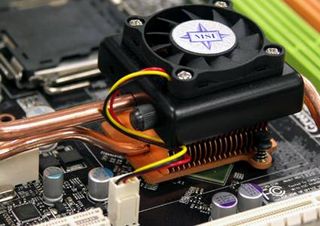Nvidia 680i Motherboard Comparison Part 2
Overclocking
The P6N Diamond includes all necessary manual controls with very fine CPU core voltage settings for finding the best balance between signal strength and heat, reasonably small platform voltage increases and 1 MHz clock speed adjustments. Neophytes might also like to try separate CPU and RAM automatic overclock settings of 1-15% even though the "optimal" settings for various components will likely differ from automatically-assigned values.
| BIOS Frequency and Voltage settings (for overclocking) | |
|---|---|
| FSB Frequency | 100 - 625 MHz (1 MHz) |
| Clock Multiplier Adjustment | Yes |
| DRAM Frequency | 400-1400 MHz Data Rate |
| PCIe Clock | 100-200 MHz (1 MHz) |
| SPP-MCP HT Link Clock | 200-500 MHz (1 MHz) |
| CPU Vcore | Default - +0.3875 Volts (0.0125 Volts) |
| CPU FSB Voltage | Default, 2%-4%-8%-12%-16%-20 % |
| Northbridge (SPP) | 1.20 - 1.50 Volts (0.05 Volts) |
| Southbridge (MCP) | 1.50 - 1.70 Volts (0.10 Volts) |
| Chipset Link Voltage | Not Adjustable |
| DRAM Voltage | 1.800 - 2.800 Volts (0.05 Volts) |
| CAS Latency Range | |
| tCAS: 1-6; tRCD: 1-7; tRP: 1-7; tRAS: 1-31; Command Rate: 1T/2T |
The P6N Diamond is still a late-development-stage product, and even the most currently available beta BIOS wasn't able to get similar stability at comparable settings compared to Nvidia's reference design. A result of 3.42 GHz using a test CPU normally capable of 3.46 GHz was the result, and dropping the CPU multiplier never allowed the board to exceed that 342 MHz bus clock (FSB 1368).
Accessories
MSI sent its board pre-production board, which lacked any retail accessories you'll later find in the finished package. The most significant of those missing parts is the chipset fan.

The P6N Diamond heatpipe arrangement relies heavily on a high-speed CPU fan to move air past it, and requires the additional cooling of its accessory fan whenever low-airspeed CPU cooling is used. I found this out the hard way as the system exceeded stable heat levels at stock speed and voltage settings using the quiet-fan Cooler Master Hyper TX.
Stay on the Cutting Edge
Join the experts who read Tom's Hardware for the inside track on enthusiast PC tech news — and have for over 25 years. We'll send breaking news and in-depth reviews of CPUs, GPUs, AI, maker hardware and more straight to your inbox.
Most Popular


